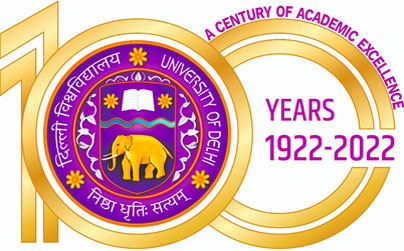VAC 1: THE ART OF BEING HAPPY
Credits
02
Lecture
01
Tutorial
0
Practical/Practice
01
Eligibility criteria
Pass in Class 12th
Pre-requisite of the course
NIL
- To synthesize the insights developed by Human Development experts, Psychologists, Anthropologists on one hand, and the intellectual traditions of Vedantic Philosophy and lndology on the other towards the experience of happiness.
- To illustrate various factors that determine the subjective experience of happiness in a cross cultural context.
- The students shall be able to evaluate the factors contributing to the phenomenon of happiness in the personal, familial and community life of an individual in different cultures in the Indian context.
- They will be able to develop healthy interpersonal relationships and wellbeing cherishing the values of Indian culture and philosophy.
- They will be able to relate to the global phenomenon of sustainable development and become sensitive to the needs of the planet.
- They will be able to apply the experience of Aananda at a personal level.
UNIT- I Human Ecology and Happiness Lectures (3 Weeks)
- Definitions/Factors of Happiness: Environmental and Social
- Physical, emotional and psychological well-being for happiness
- Physiological and hormonal basis of happiness
- Coping with Stress: A life saving skill
UNIT- II lndological Theories of Happiness (4 Weeks)
- Panch Kosh Theory & Idea ofWell-Being
- Idea of Self and other
- Hierarchy and stages of happiness
UNIT- III Happiness: Cross-cultural Contexts (4 Weeks)
- Culture and Happiness
- Interpersonal Relationship: Comparative Perspective
- Towards Self-Actualization
UNIT - IV Local and Global Perspective of Happiness (4 Weeks)
- Measuring happiness: Key indicators
- Happiness Index
- India in Global Happiness Indices
The course will be based on students' identification and operationalization of the concept of happiness and well-being. Students will explore the indicators and actualization of these concepts in everyday life.
- Community surveys on the facilities promoting positive mental health practices such as Yoga and Meditation Centres, Recreation clubs, and Parks for youth and senior citizens shall be carried out by the students
- Extending help and social service by visiting old age homes/ hospitals/slum areas or any other disadvantaged groups
- Students can undertake a field work/ project independently or work as an Intern with NGOs working in the area of happiness and well-being.
- Critical appreciation of a documentary/ film based on Happiness and Wellbeing can be undertaken by the students.
- Workshops/ Sessions for the actualization of innate creative potential- (Music, Drawing, Calligraphy, Dramatics)
- Hands-on Happiness: Gardening, Cleaning, Washing, Cooking, etc
- Organise Swachhata Pakhwada meetings, rallies, and mobilization camps within the identified communities.
- If required, students can share their experiences in the form of a Project Report.
- Students may share their experiences in the form of Audio-video presentations of 15-20 minutes.
- Any other Practical/Practice as decided from time to time
- Banavathy, Vinayachandra & Choudry, Anuradha. (2013). Understanding Happiness: A Vedantic Perspective. Psychological Studies. 59. 141-152. 10.1007 /s12646-013-0230-x.
- Leontiev, Dmitry. (2012). Anthropology of Happiness: the state of Well-Being and the way of Joy,ln SocialScience,sVol43. No 2 P93-104.
- Snyder .C.R. S.J. Lopez & J.T. Pedrotti. (2015). Positive Psychology (The Scientific and Practical Explorations of Human Strengths): Sage Publication. (Chapter 5: Subjective Well-being: The Science of Happiness and Life Satisfaction, Page 63 to 73)
- World Development Indicators 2016. (2016).United States: World Bank Publications.
- Zelenski, John. (2019) Positive _Psychology: The Science of Well-Being, Carleton University, Ottawa, Canada, Sage Publications Chapter 3:Happiness;page (77 to 110)
- Baumgardner,S&Crothers, M.(2014).Positive Psychology. New Delhi: Pearson Education, India.
- Goleman,D.(2007).Social Intelligence: The new science of human relationships, RHUK
- Mathews, Gordon and Carolina Izquierdo (eds). (2010). Pursuits of Happiness: Well being in Anthropological Perspective. Berghan Books
- Seligman,M.(2002). Authentic happiness: Using the new positive psychology to realize your potential for lasting fulfilment. NewYork:Free Press.
- Sri Aurobindo, The Synthesis of Yoga, Part Three: The Yoga of Divine Love, Chapter 7, The Ananda Brahman, pp. 569-570
Examination scheme and mode: Subject to directions from the Examination Branch/University of Delhi from time to time


